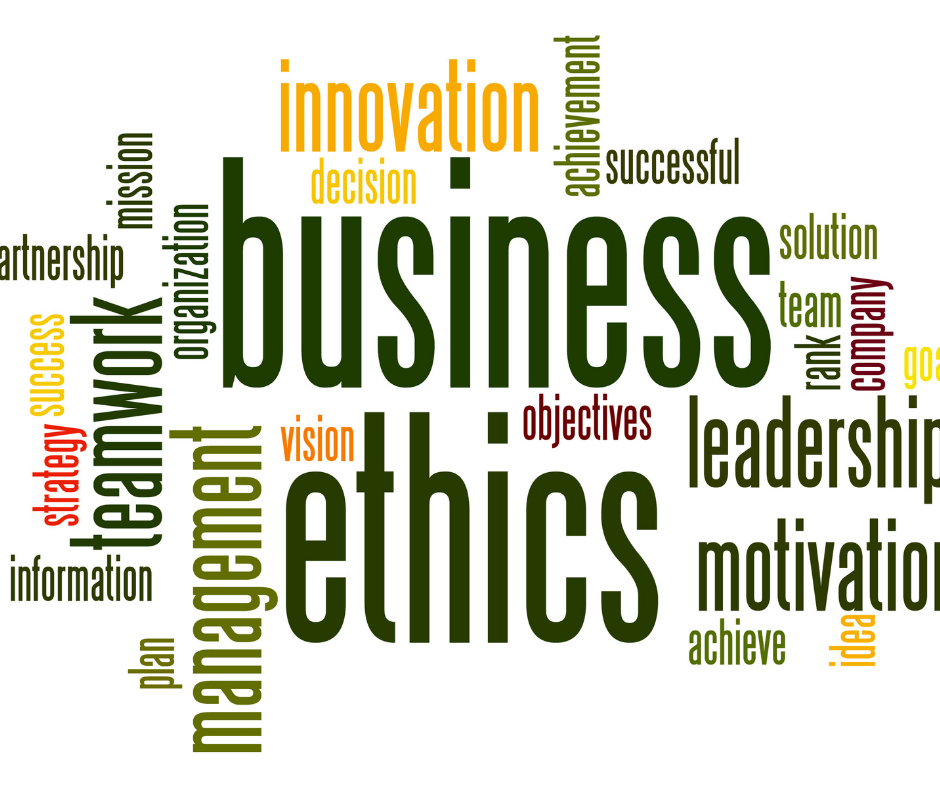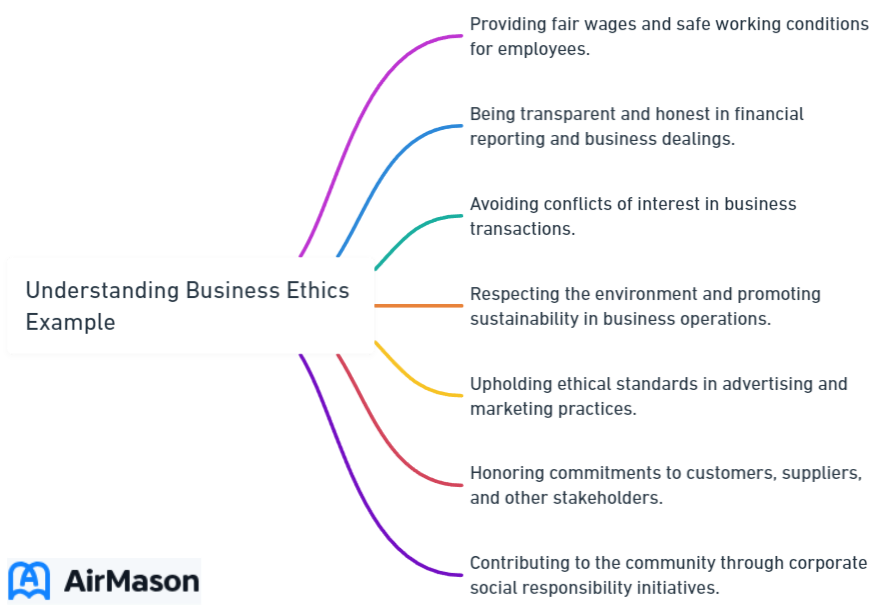
In today’s fast-paced corporate world, business ethics have become increasingly important for organizations that aim to succeed in the long term. Companies that embrace ethical principles and practices not only earn the trust of their stakeholders but also set themselves apart from competitors. Let’s dive into the world of business ethics, explore real-life business ethics example scenarios, and understand the role of technology in upholding these principles.
Key Takeaways
- Business ethics refer to the moral principles that guide organizations in their decision-making processes.
- Real-life examples demonstrate how upholding ethical practices builds trust, reputation and long term success.
- Principles of accountability, responsibility, care and respect are essential for businesses to promote an ethical culture within the organization.
Defining Business Ethics
Business ethics refer to the moral principles, values, and standards that guide organizations in their decision-making processes, thus influencing their behavior and reputation. Business ethics emerged in the 1960s in response to the concerns of a consumer-based society. These included environmental protection, social causes, and corporate accountability..
Business ethics serve to guide organizations into acting fairly and honestly according to their stakeholders, fostering customer trust and guiding ethical decision-making among owners, managers, and employees. These ethical principles form the foundation of corporate governance, ensuring that businesses operate ethically and responsibly, making business ethics important. By implementing business ethics practices, organizations can further strengthen their ethical foundation and corporate governance.
Key ethical principles in business include:
- Honesty
- Fairness
- Leadership
- Integrity
- Compassion
- Respect
- Responsibility
- Loyalty
- Adherence to the law
- Transparency
- Environmental conscientiousness
Personal ethics also play a significant role in shaping the ethical behavior of individuals within a business, as they influence decision-making and interactions with colleagues and customers.

Importance of Business Ethics
The significance of business ethics stems from their role in establishing trust, cultivating a positive reputation, and attaining long-term success for businesses. A responsible and sustainable organization integrates ethical practices into all aspects of its business operations. Transparency is of great importance in business ethics, as it assists in creating trust and credibility by being open about business decisions and actions, even when they may not result in immediate personal or corporate benefit.
Corporate responsibility businesses play a crucial role in business ethics, as they should fulfill their obligations to their employees, partners, and customers, and take into account the interests of all parties involved with the business. Fairness is also of utmost importance, guaranteeing that the workplace is open to all employees, regardless of race, religion, beliefs, age, or identity, in an equitable and diverse manner.
Key Components of Business Ethics
Essential elements of business ethics encompass:
- Corporate social responsibility, which encourages businesses to take into account economic, social, and environmental aspects when making decisions
- Fair labor practices, which refer to the ethical standards businesses ought to observe when dealing with their employees, encompassing providing equitable wages, secure working conditions, and reasonable working hours
- Transparent communication, which involves open and honest communication with stakeholders
- Ethical utilization of technology, which involves using technology in a responsible and ethical manner
Transparent communication is a fundamental element of business ethics, as it serves to bolster trust and foster relationships between employees and the business, as well as with customers. Transparency in communication assists businesses in building trust with stakeholders such as customers, investors, and employees, which is essential for long-term success.
Business Code of Ethics Examples
Business code of ethics examples provide clear guidelines and standards for the conduct of individuals within a company. These codes delineate the acceptable behavior and values expected from employees, management, and stakeholders. For instance, a business code of ethics might emphasize integrity, honesty, and transparency in all dealings, promoting a culture of trust and accountability. Additionally, it may outline procedures for handling conflicts of interest, ensuring fair competition, and upholding the rights of employees and stakeholders. By presenting concrete examples and scenarios, a well-defined business code of ethics helps to align the organization’s actions with its core values, ultimately contributing to a responsible and ethical business environment.
Real-Life Business Ethics Examples

Real-life examples of ethical business practices demonstrate the positive impact of upholding business ethics in various industries. These examples serve as a testament to the value of ethical practices in driving customer loyalty, attracting investors, and engaging with business partners who adhere to ethical standards. By contributing positively to the local community, businesses can showcase their commitment to social responsibility and ethical conduct.
We will subsequently examine notable examples of companies that have successfully woven business ethics into their operations. These examples from Patagonia, Microsoft, and Johnson & Johnson serve to illustrate how ethical practices can drive positive outcomes for businesses and their stakeholders.
Corporate Social Responsibility: Patagonia
Patagonia’s dedication to environmental sustainability exemplifies the significance of corporate social responsibility in business ethics. The company has taken steps to reduce its environmental footprint, including:
- Contributing 1% of its sales to environmental organizations
- Encouraging customers to repair their products instead of buying new ones
- Incorporating recycled materials into its products
- Implementing initiatives to promote environmental sustainability, such as the self-imposed Earth tax “1% for the Planet”
- Setting a goal of eliminating virgin petroleum fiber in their products by 2025
These actions demonstrate Patagonia’s commitment to being a socially responsible business.
These initiatives demonstrate Patagonia’s commitment to environmental sustainability and responsible business practices. Some of these initiatives include:
- Using recycled materials in their products
- Offering repair services to extend the life of their products
- Donating a portion of their sales to environmental causes
- Advocating for environmental policies and regulations
Patagonia’s efforts not only contribute to a healthier planet but also resonate with customers who value businesses that align with their ecological concerns, resulting in increased brand loyalty and long-term success.
Fair Labor Practices: Microsoft
Microsoft’s commitment to fair labor practices highlights the significance of treating employees ethically. The company has pledged to pay a living wage. Furthermore, it provides several benefits for its employees, including paid leave and parental leave. Microsoft implements a number of fair labor practices, such as empowering employees, guaranteeing equal employment opportunity, advocating for human rights and fair labor practices, and adhering to laws and regulations.
Microsoft also ensures paid leave for its personnel by implementing an unlimited paid leave policy, allowing employees the discretion to take as much time off as they deem necessary without any specific limit. By prioritizing employee well-being, Microsoft fosters a positive work environment and promotes employee retention and satisfaction.
Transparent Communication: Johnson & Johnson
In 1982, Johnson & Johnson faced a crisis when adulterated Tylenol bottles resulted in fatalities. The company’s swift product recall and transparent communication exemplify the value of transparency in building trust and credibility. Johnson & Johnson took prompt action to guarantee the safety of their patrons and collaborated closely with law enforcement and the FDA to examine the tampering incidents.
This transparent response enabled the Tylenol brand to recover, thereby demonstrating the company’s loyalty to its customers. By being candid and truthful about their actions, corporations can show their dedication to ethical business practices and create a favorable brand image.
Compliance Based Code of Ethics
A compliance-based code of ethics is a structured framework that guides an organization’s conduct, emphasizing adherence to applicable laws, regulations, and internal policies. This approach centers on ensuring that employees and stakeholders conform to prescribed standards, promoting a culture of legal and ethical behavior. The fundamental objective of a compliance-based code of ethics is to mitigate risk by fostering a culture of accountability and transparency. It articulates the organization’s commitment to upholding legal and regulatory requirements, outlining the consequences of non-compliance. Employees are expected to fully understand and follow these guidelines, which are regularly updated to reflect changing laws and industry norms. Ultimately, a compliance-based code of ethics helps an organization demonstrate its dedication to lawful operations and responsible business practices.
The Role of Technology in Business Ethics

Technology plays a vital role in maintaining business ethics, particularly with regard to data privacy, security, and marketing. As technology continues to advance, businesses must adapt and incorporate ethical practices into their operations to ensure the protection of sensitive customer information and maintain transparency in their marketing efforts.
Next, we’ll examine how companies like Apple and Dove have successfully integrated technology ethics into their business practices, underscoring the importance of data privacy, security, and ethical marketing in maintaining business ethics.
Data Privacy and Security: Apple
Apple’s strict privacy policies serve as an example of ethical behavior in protecting sensitive customer information. The company has implemented the following measures to ensure privacy and security:
- Strong security methods
- Strict policies to protect user information
- Privacy-preserving technologies
- Privacy and security training for employees
- Security features on devices and iCloud to hinder unauthorized access to data
By prioritizing data privacy and security, Apple demonstrates its commitment to ethical business practices and maintains the trust of its customers. This focus on privacy and security not only protects sensitive information but also contributes to the company’s long-term success and reputation.
Ethical Marketing: Dove’s “Real Beauty” Campaign
Dove’s “Real Beauty” campaign demonstrates the power of ethical marketing in promoting positive body image and prioritizing consumers’ needs and interests. Launched in 2004, the campaign sought to redefine traditional beauty standards and promote inclusivity and diversity by featuring diverse women in their advertisements. The campaign also includes initiatives such as the Dove Self-Esteem Project, which endeavors to enhance body confidence and self-esteem in young individuals.
By addressing the unrealistic beauty standards in the media, Dove’s “Real Beauty” campaign resonated with consumers who desired brands that celebrated diversity and real beauty. This ethical marketing approach helped to cultivate trust with customers and enhance the company’s reputation.
Principles Guiding Ethical Business Practices

Principles guiding ethical business practices include:
- Accountability
- Responsibility
- Care
- Respect for all stakeholders involved
These principles serve as the foundation for ethical decision-making and help businesses navigate complex situations and challenges. By adhering to these principles, businesses can foster a healthy and ethical work environment and ensure long-term success.
Next, we will delve into the significance of accountability and responsibility, along with care and respect for stakeholders, in nurturing a healthy and ethical business environment.
Accountability and Responsibility
Businesses must take full responsibility for their actions and ensure accountability for any unethical business practices during their operations. By acknowledging and accepting responsibility for their actions, decisions, and behavior, businesses demonstrate their commitment to ethical conduct and set an example for others within the organization.
To foster a sense of responsibility and accountability among their teams, businesses can implement strategies such as:
- Establishing clear expectations
- Assigning tasks to individuals
- Following up
- Cultivating a positive culture
- Demonstrating leadership by example
- Offering training and development opportunities
- Promoting peer accountability
By assuming responsibility and ensuring accountability, businesses can foster trust, integrity, and a culture of ethical behavior within the workplace.
Care and Respect for Stakeholders
Care and respect for stakeholders, including employees, customers, and partners, are essential in fostering a healthy and ethical business environment. Demonstrating care and respect for stakeholders not only promotes a positive work atmosphere but also contributes to improved employee satisfaction, increased customer loyalty, enhanced reputation and trust, and greater innovation and problem-solving.
By recognizing and valuing the contributions of all stakeholders, businesses can create an inclusive and supportive environment that fosters collaboration, growth, and long-term success. Care and respect for stakeholders are integral to the overall success of a business and the well-being of all those involved.
Code of Conduct Examples
When considering appropriate behavior and expectations within a community or organization, examining code conduct examples can offer valuable insights. These code conduct examples serve as guidelines and frameworks to ensure that individuals within a given environment conduct themselves in a respectful, inclusive, and responsible manner. Common elements found in code of conduct examples often include treating others with respect, fostering an inclusive and diverse environment, refraining from harassment or discrimination, and maintaining professionalism. By studying and understanding these exemplars, individuals can cultivate a shared understanding of acceptable conduct, thereby promoting a positive and cooperative atmosphere within the community or workplace. It’s crucial to tailor these examples to specific contexts, acknowledging the unique needs and values of each group or organization.
Challenges and Solutions in Implementing Business Ethics

Implementing business ethics can be challenging, but finding solutions to promote an ethical culture within the organization is crucial for long-term success. Businesses must navigate complex ethical dilemmas, balance profitability with ethical practices, and foster an ethical culture among their employees.
We’ll now discuss some challenges businesses encounter when implementing business ethics, and propose potential solutions to encourage ethical practices within the organization.
Balancing Profitability and Ethics
Balancing profitability and ethics is a key challenge for businesses, as ethical practices may sometimes require trade-offs with short-term profits. Businesses that prioritize ethical practices over short-term gains can build trust with customers, attract investors, and ultimately achieve long-term success. Companies such as Lego, Salesforce, Ben & Jerry’s, and Levi Strauss have successfully achieved a balance between profitability and ethics, demonstrating that it is possible to maintain a commitment to ethical business practices while remaining profitable.
By integrating ethical practices into business operations, companies can create a solid foundation for long-term success and stakeholder satisfaction. Balancing profitability and ethics requires conscious effort, but the benefits of doing so far outweigh the potential costs.
Promoting Ethical Culture within the Organization
Creating a code of conduct, providing training programs, and establishing reporting procedures are key steps towards promoting an ethical culture within the organization, thereby encouraging ethical behavior among employees.
- A strong code of conduct serves as a guideline for employees to follow.
- Training programs help to educate employees about the importance of ethical decision-making and responsible behavior.
- Reporting procedures ensure that employees feel comfortable reporting unethical behavior without fear of retribution.
By fostering an ethical culture within the organization, businesses can promote a positive work environment, improve employee retention, and maintain a strong reputation. Implementing these strategies is essential for businesses seeking to uphold ethical standards and ensure long-term success.
Summary
In conclusion, business ethics play a vital role in shaping the behavior and reputation of organizations in today’s corporate world. By adhering to ethical principles, businesses can build trust with stakeholders, ensure long-term success, and contribute positively to society. Real-life examples, such as Patagonia, Microsoft, and Johnson & Johnson, demonstrate the power of ethical business practices. As technology continues to advance, businesses must also consider the role of technology ethics in protecting sensitive customer information and promoting transparent communication. By balancing profitability with ethical practices and promoting an ethical culture within the organization, businesses can create a solid foundation for long-term success and stakeholder satisfaction.
Frequently Asked Questions
What are some examples of business ethics issues?
Business ethics issues can include discrimination, harassment, unethical accounting, health and safety, abuse of leadership authority, nepotism and favoritism, privacy, and corporate espionage.
What are business ethics in everyday life?
Business ethics encompass standards of accountability, loyalty, integrity and ethical behavior in the workplace. They are integral for guiding decision-making, maintaining a good reputation, and ensuring future success. In everyday life, business ethics can be seen as principles that guide us toward making the right decisions to benefit the common good.
What are the 7 principles of business ethics?
The seven principles of business ethics are accountability, care and respect, honesty, healthy competition, loyalty, transparency, and respect for the rule of law.
What are the key components of business ethics?
Business ethics encompass corporate social responsibility, fair labor practices, transparent communication, and ethical utilization of technology, providing the foundation for responsible business conduct.
Can a business be both profitable and ethical?
Yes, businesses can be both profitable and ethical by integrating ethical practices into their operations and fostering trust with customers. This allows them to attract investors and achieve long-term success.